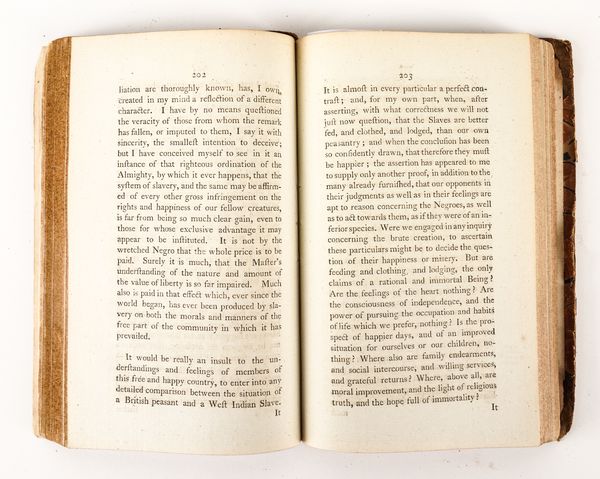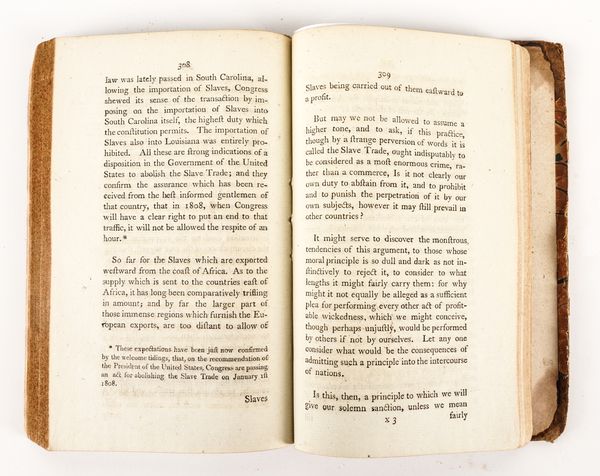SLAVERY - William WILBERFORCE (1759-1833). A Letter on the Abolition of the Slave Trade; Addressed to the Freeholders of Yorkshire, London, 1807, 8vo, contemporary half calf (very worn, covers detached). FIRST EDITION. PMM 232(b); Sabin 103953.
| Estimate: | £500 - £800 |
| Hammer price: | £1,400 |
SLAVERY - William WILBERFORCE (1759-1833). A Letter on the Abolition of the Slave Trade; Addressed to the Freeholders of Yorkshire. London: "Printed by Luke Hansard & Sons, for T. Cadell and W. Davies, Strand; And, J. Hatchard, Piccadilly," 1807. 8vo (211 x 133mm). (Without the half title, small stain to upper margin of title and the first few leaves not affecting letters, small hole in one contents leaf not affecting letters, tear to Y4 with neatly stitched repair touching one letter, closed tear without loss to upper margin of final text leaf, 3 puncture holes at gutter, some very light mainly marginal spotting and staining, a few darker spots, for instance, to the margin of the verso of E3 and recto of E4, without the publisher's advertisements at the end.) Contemporary half calf and marbled boards (very worn, both boards detached, heavily rubbed with erosion to spine and corners). Provenance: "Willm. Henry Ho ... [word cropped after "o"], Feb. 1809" (signature at head of title); some illegible old pencil annotation to front pastedown. FIRST EDITION of this fundamental abolitionist work which is notable both for its appeal to reason and to the emotions, and for encouraging, as in the following printed passage, a direct empathy for the enslaved: "Conceive, if you can, the agony with which, as he [the newly enslaved man] is hurried away by his unfeeling captors, he looks back upon his native village which contains his wife and children who are left behind; or, supposing them to have been carried off also, with which he sees their sufferings, and looks forward to the dreadful future; while his own anguish is augmented by witnessing theirs. Accompany him through his long and painful march to the coast; behold him, when the powers of nature are almost exhausted by fatigue and affliction, urged forward like a brute by the lash, or, with still more bitterness of suffering, seeing the fainting powers of his wretched wife or daughter roused into fresh exertions by the same savage discipline. Behold him next brought on shipboard and delivered over to men, whose colour, appearance, language, are all strange to him, while every object around must excite terror ..." (from pp.341-342). "One most obvious characteristic of Wilberforce was the singular personal attractiveness of which his biographers confessed their inability to give any adequate description. His transparent kindliness and simplicity made him lovable even to his antagonists. He escaped contamination at the cost of standing aside from the world of corruption and devoting himself to purely philanthropical measures. Though profoundly convinced of the corruption of human nature in general, he loved almost every particular human being ..." (DNB, edited). PMM 232(b): "... [F]inally on 25 March 1807 the royal assent was given to a bill abolishing the trade in slaves. This, signalized by Wilberforce's Letter, was the first major victory for the [abolitionist] movement"; Sabin 103953.






